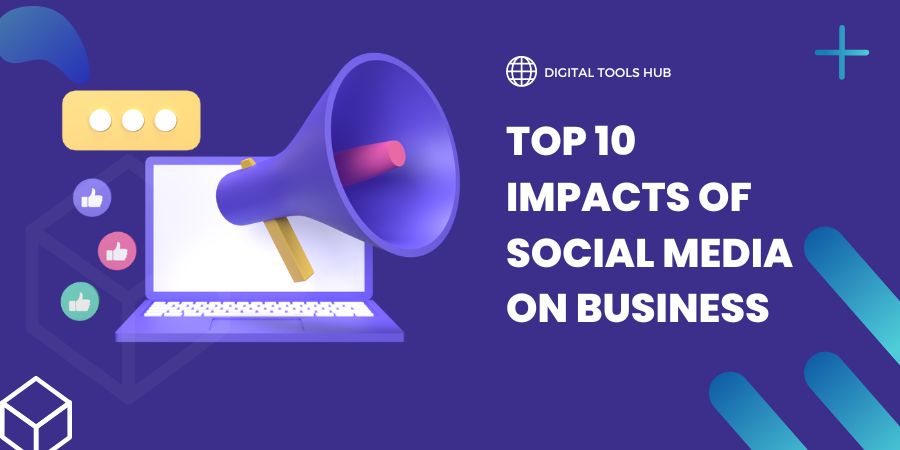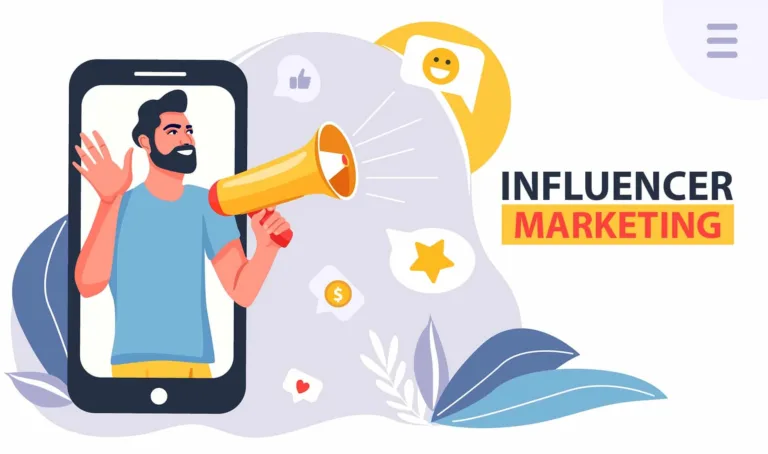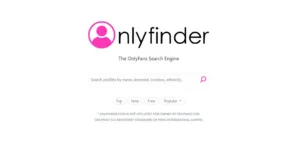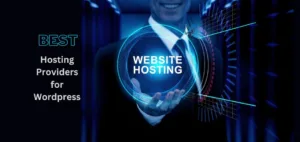Impacts of Social Media on Business

Introduction
Impacts of social media – Social media has revolutionized the way we communicate and interact with each other. It has also had a significant impact on businesses.
Today, social media platforms like Facebook, Twitter, Instagram, and LinkedIn are essential tools for businesses to reach their customers, build brand awareness, and drive sales.
In this article, we will discuss the top 10 impacts of social media on business.
Table of Contents
Increased Brand Awareness

Social media allows businesses to reach a wider audience than ever before. With millions of active users on these platforms, businesses can easily connect with potential customers, build their brand, and increase their visibility.
What businesses can do to Increase brand awareness?
- Develop a strong brand identity – Create a distinctive brand logo, tagline, and visual elements that resonate with your target audience.
- Consistent messaging – Ensure your brand messaging is clear, consistent, and aligned with your brand values across all channels and touchpoints.
- Content marketing – Create valuable and engaging content that showcases your expertise, solves customer problems, and educates your audience about your products or services.
- Social media presence – Establish a strong presence on relevant social media platforms to connect with your target audience, share valuable content, and engage in conversations.
- Influencer partnerships – Collaborate with influencers or industry experts who align with your brand values and have a significant following to amplify your brand message.
- Public relations – Engage in public relations activities such as press releases, media coverage, and industry partnerships to increase your brand’s visibility.
- Sponsorships and events – Sponsor or participate in industry events, conferences, or community initiatives to raise awareness and establish your brand as a trusted authority.
- Online advertising – Invest in targeted online advertising campaigns to reach a wider audience and increase brand visibility.
- Customer advocacy – Encourage and leverage positive customer reviews, testimonials, and user-generated content to build trust and credibility.
- Community engagement – Actively participate in online communities, forums, and social groups relevant to your industry to establish your brand as a knowledgeable and trusted resource
Improved Customer Engagement

Social media platforms offer businesses a direct and immediate way to interact with their customers. This means businesses can respond quickly to customer queries, complaints, and feedback, improving customer satisfaction and loyalty.
Chatbots are an effective tool for businesses looking to improve their customer engagement. By providing quick and efficient responses, personalizing interactions, and offering 24/7 availability, chatbots can help businesses build strong relationships with their customers and improve overall customer satisfaction.
Here are some platforms that businesses can use to maintain improved customer engagement
- Social media platforms (e.g., Facebook, Instagram, Twitter)
- Customer relationship management (CRM) software (e.g., Salesforce, HubSpot)
- Live chat tools (e.g., Intercom, Zendesk Chat)
- Email marketing platforms (e.g., Mailchimp, Constant Contact)
- Customer feedback and survey tools (e.g., SurveyMonkey, Typeform)
- Online community platforms (e.g., Discourse, Lithium)
- Customer support ticketing systems (e.g., Zendesk, Freshdesk)
- Marketing automation software (e.g., Marketo, Pardot)
Targeted Advertising

Social media platforms provide businesses with powerful advertising tools that allow them to target specific demographics and interests. This means businesses can create highly personalized and targeted ad campaigns that are more likely to resonate with their audience.
What are the advantages of targeted advertising in social media over traditional advertising?
- Precise audience targeting
- Cost efficiency
- Higher engagement rates
- Improved ROI
- Enhanced personalization
- Testing and optimization
- Flexibility and agility
Increased Website Traffic

Social media is a powerful tool for driving traffic to a business’s website. By sharing content, offers, and promotions on social media, businesses can attract more visitors to their website, increasing the chances of converting them into customers.
What are those social media tools businesses can use for increasing website traffic?
- Hootsuite – Schedule and manage posts across multiple social media channels.
- Buffer – Schedule and automate social media posts for consistent promotion.
- Sprout Social – Monitor and analyze social media performance to optimize strategy.
- Buzzsumo – Discover popular and trending content to share on social media.
- MeetEdgar – Automate social media posting by recycling evergreen content.
- Click-to-Tweet – Create tweetable quotes to encourage social media sharing.
- SocialBee – Categorize and recycle content for increased visibility on social media.
Influencer Marketing

Social media has given rise to a new form of marketing known as influencer marketing. Businesses can partner with social media influencers who have large followings to promote their products or services, reaching a wider audience and increasing brand awareness.
List of Social platforms businesses can use for their influencer marketing needs:
- Instagram – Instagram is one of the most popular platforms for influencer marketing, with influencers across various niches and industries.
- YouTube – YouTube is a video-sharing platform where businesses can collaborate with influencers who have a strong following and create engaging video content.
- TikTok – TikTok has gained immense popularity, especially among younger audiences. It offers opportunities for businesses to partner with influencers and create short-form video content.
- Facebook – Facebook has a vast user base and offers influencer marketing options through sponsored posts, branded content, and collaborations with popular Facebook pages.
- Twitter – Twitter allows businesses to connect with influencers who have a strong presence on the platform, particularly for real-time conversations and trending topics.
- LinkedIn – LinkedIn is primarily known for professional networking, but it also offers opportunities for B2B influencer marketing and collaborating with industry experts.
- Pinterest – Pinterest is a visual discovery platform, and businesses can partner with influencers to create inspiring and informative content related to their products or services.
- Snapchat – Snapchat is a popular platform among younger demographics, and businesses can work with influencers to reach this specific audience through sponsored content and filters.
- Blogs and Websites – Many influencers have their own blogs or websites where they create content and engage with their audience. Businesses can collaborate with them through sponsored posts or guest blogging.
- Influencer Marketing Platforms – There are also dedicated influencer marketing platforms like Upfluence, AspireIQ, and Grin that help businesses discover and connect with influencers, manage campaigns, and track results.
Improved Customer Insights
Social media platforms provide businesses with valuable customer insights, including demographic information, interests, and behavior. This information can help businesses create more targeted marketing campaigns and improve their overall marketing strategy.
Reputation Management
Social media is a powerful tool for managing a business’s reputation. Businesses can use social media to monitor what people are saying about them online and respond quickly to any negative comments or reviews.
Apart from Social media tools, here are is a list of tools businesses can use for Reputation management
- Social Media Listening Tools – Hootsuite, Sprout Social, Brandwatch.
- Online Review Management Platforms – Trustpilot, Google My Business, Yelp.
- Customer Feedback and Survey Tools – SurveyMonkey, Typeform, Google Forms.
- Brand Monitoring Tools – Mention, Google Alerts, Brand24.
- Online Reputation Management Platforms – Reputation.com, ReviewTrackers, Birdeye.
- CRM and Customer Service Software – Salesforce, HubSpot, Zendesk.
These tools and platforms help businesses manage their reputation by monitoring social media, online reviews, customer feedback, brand mentions, and providing comprehensive solutions for online reputation management.
Cost-Effective Marketing

Social media is a cost-effective marketing channel, allowing businesses to reach a large audience without spending a lot of money on advertising. This is especially beneficial for small businesses with limited marketing budgets.
Here are some of the reasons why social media is cost-effective compared to traditional marketing:
- Lower Advertising Costs
- Targeted Advertising
- Flexible Budgeting
- Organic Reach and Engagement
- Measurable Results
- Enhanced Customer Interaction
- Viral Potential
Competitive Advantage

Businesses that use social media effectively can gain a competitive advantage over those that don’t. By leveraging the power of social media, businesses can differentiate themselves from their competitors and attract more customers.
Real-Time Marketing

Social media allows businesses to respond quickly to current events and trends, creating real-time marketing opportunities. This means businesses can stay relevant and engage with their audience in real-time, improving brand perception and increasing customer loyalty.
How business can do Real-time marketing?
Businesses can engage in real-time marketing by following these key steps:
- Monitor trends and events – Stay updated on current events, industry news, and trending topics relevant to your target audience.
- Be agile and responsive – Act quickly to leverage timely opportunities by creating content or promotions related to trending topics or events.
- Leverage social media – Utilize social media platforms to share real-time updates, engage with customers, and participate in conversations around trending topics.
- Use hashtags strategically – Incorporate relevant hashtags in your real-time marketing content to increase visibility and join relevant conversations.
- Personalize and customize – Tailor your content to resonate with your audience’s interests and preferences, leveraging real-time data and insights.
- Utilize real-time analytics – Monitor the performance of your real-time marketing efforts and make adjustments as needed based on real-time data and insights.
- Collaborate with influencers – Partner with influencers or industry experts to amplify your real-time marketing efforts and reach a wider audience.
- Stay authentic and relevant – Ensure your real-time marketing efforts align with your brand values and resonate with your target audience.
Conclusion:
Optimizing your website using SEO tools is essential for improving your website’s SEO. Conducting a site audit, conducting keyword research, optimizing on-page elements, analyzing your backlinks, and monitoring your website’s performance are all essential for optimizing your website’s SEO. By using these SEO tools, you can improve your website’s SEO, rank higher on search engine result pages, and drive more traffic to your website.




